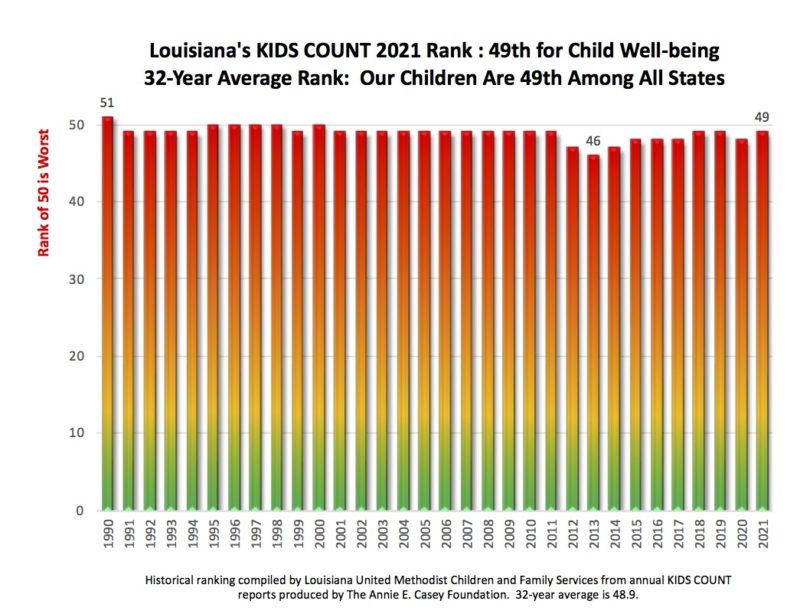An Open Letter to the Louisiana Legislature Regarding Senate Bill 2
PDF Version: Open Letter: Regarding Senate Bill 2 Friday, November 15, 2024 An Open Letter to the Louisiana Legislature Regarding… Read More
Ranked 51st in 1990 and 49th in 2022. Louisiana has made little progress in the overall condition of our children. In fact, I believe “well-being” is the wrong word to use regarding Louisiana’s children! The correct phrase is “Louisiana Child Distress”.
When we use “well-being” to describe the condition of Louisiana’s children relative to other states (and countries), we misuse the word “well-being” and risk deluding ourselves to the detriment of our children.
Consider the KIDS COUNT project of the Annie E. Casey Foundation. “KIDS COUNT is a project of the Annie E. Casey Foundation and a premier source of data on children and families. Each year, the Foundation produces a comprehensive report — the KIDS COUNT Data Book — that assesses child well-being in the United States.”
KIDS COUNT will not tell you this, but I have tallied the history rank of Louisiana’s children during the 32 years of KIDS COUNT Data Books. This is the chart:

Louisiana holds a 32-year average rank of 49th among the states. 49th for three decades is NOT “well-being.” Rather, it is the opposite of well-being. (Can you imagine the uproar if any team at LSU ranked next to last for 32 years?)
How should one think about this? I suggest the top 25 ranked states present a continuum of well-being, and the bottom 25 states range from average well-being to the very opposite of well-being.
So, what IS the opposite of well-being? Bad-being? Ill-being?
Merriam-Webster defines well-being this way: “the state of doing well, especially in relation to one’s happiness or success.”
I am biased, perhaps, by thirty two years of child welfare perspective. Still, when I consider Louisiana’s children, the word “distress” comes to my mind. The opposite of well-being is distress.
Standard antonyms of “well-being” include unhealthiness, unsoundness, misery, sadness, suffering, unhappiness, wretchedness, and ill-being. Together, these all sound like distress.
Are we duping ourselves with an unintentional euphemism when we speak about the “well-being” of Louisiana’s children? I think we are! Would it not be more accurate to say “child distress”?
Try it. First, say aloud, “Louisiana child well-being.” Now, say, “Louisiana child distress.” Does it spark a difference for you? The words we use matter. Words create perceptions. We must avoid misleading language when describing the condition of Louisiana’s children.
If a state ranks among the top 25 for the condition of its children, let it use “child well-being.” Otherwise, if the condition of a state’s children ranks it among the bottom 25, use “child distress.”
Call It What It Is
I believe it is time that we in Louisiana begin using the correct words to describe the conditions of our children. In doing so we may draw focused attention to the long history of child distress in our state. I will be intentional and replace “child well-being” with “child distress” when describing the condition of Louisiana’s children.
I believe using the proper word will help me appreciate the important work our organization and others are doing on behalf of children and families. Especially those drowning in the deep end of child distress in Louisiana.
Rick Wheat
President & CEO
Louisiana United Methodist Children and Family Services